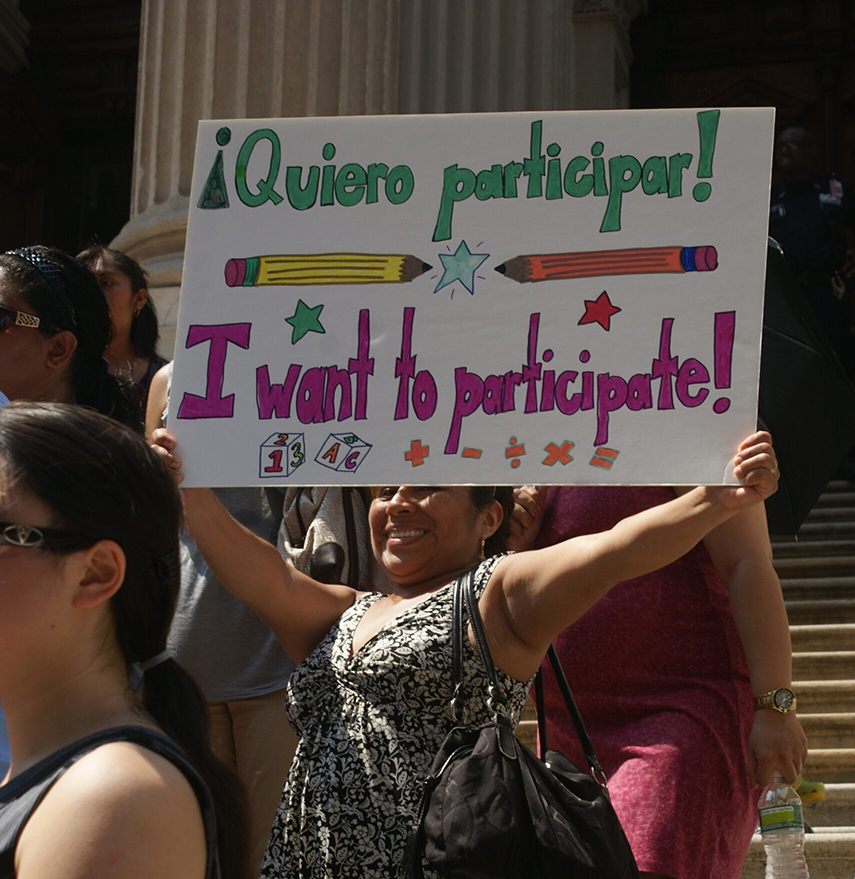More than Translation: Multi-Faceted Solutions for Communicating with NYC’s Immigrant Families
This June 2022 data analysis estimates that more than 329,000 public school students do not have a parent who speaks English fluently and calls for investments in a permanent, central system for immigrant family communications at the Department of Education (DOE). The analysis uses data from the U.S. Census Bureau American Community Survey (ACS) to illustrates the need for multi-faceted approaches to communication that go beyond making translated documents available online.

Advocates for Children of New York (AFC) released a new data analysis, More than Translation: Multi-Faceted Solutions for Communicating with NYC’s Immigrant Families, estimating that more than 329,000 public school students do not have a parent who speaks English fluently and calling on Mayor Adams and the City Council to invest $6 million in the FY 2023 budget to establish a permanent, central system for immigrant family communications at the Department of Education (DOE). While the FY 2022 budget included $4 million in one-year funding for targeted outreach and communication to immigrant families, Mayor Adams did not extend it in his Executive Budget; unless the Mayor and Council take action to include it in the adopted budget, set to be finalized as soon as this week, it will expire at the end of June.
Using data from the U.S. Census Bureau American Community Survey (ACS), the analysis illustrates the need for multi-faceted approaches to communication that go beyond making translated documents available online. For example:
- An estimated 55,585 students’ parents have no more than an 8th grade education in addition to not being proficient in English. This potentially limits their ability to read and understand translated materials from the DOE explaining complex processes, systems, and regulations—documents that can often be confusing even for native English speakers with college degrees.
- An estimated 61,657 children of Limited English Proficient (LEP) parents live in households without broadband internet access, meaning that information communicated to families online or via email is unlikely to reach them in a timely manner, if at all.
- An estimated 29,608 students’ parents have limited English proficiency and communicate in a language outside of the top nine (Arabic, Bengali, Chinese, French, Haitian Creole, Korean, Russian, Spanish, and Urdu) into which DOE documents are routinely translated.
“Our on-the-ground experience working with families has shown us that many parents never receive critical information when it is only available via translated documents posted online,” said Diana Aragundi, staff attorney at AFC. “For example, we have worked with immigrant parents who primarily speak languages like Nahuatl or Mixtec and so are forced to rely on their second language, Spanish, in order to communicate with their children’s schools, even though they have limited literacy in Spanish.”
“My child’s school sends me information by email. I don’t know how to use email that well. And the emails are always in English, even though the school knows I do not speak English. I have to ask my children for help to understand what the email says.”
Florentina, a Spanish-speaking parent of 10-year-old in a Bronx school
Ensuring that immigrant parents get needed information and can play a meaningful role in their children’s education requires multi-faceted approaches that take into account their varying levels of literacy and access to digital media. The DOE has been meeting with a work group to determine the most effective uses for the $4 million it received last year, including using local ethnic media to share updates from the DOE, sending paper notices to families’ homes, reaching families over telephone and text message, and collaborating with immigrant-facing community-based organizations (CBOs) to create and launch information campaigns. This important work requires funding to continue.
“We work with so many immigrant families who have felt sidelined in their child’s education or who have been left in the dark because no one from the DOE, including their children’s schools, tried to communicate with them in a way they could actually understand,” said Rita Rodriguez-Engberg, director of AFC’s Immigrant Students’ Rights Project. “If the new administration is serious about its desire to empower parents as true partners, then the City should be increasing—and certainly not cutting—the multi-faceted immigrant family communication and outreach initiative.”
-
View the press release as a PDF
June 9, 2022
Media Coverage
-
Advocates: Schools need more funding to better communicate with immigrant families
-
Budget Deal Maintains $4 Million to Boost Communication with Immigrant Families in NYC Schools
-
Limited English proficient parents need support to access info about their children’s education


